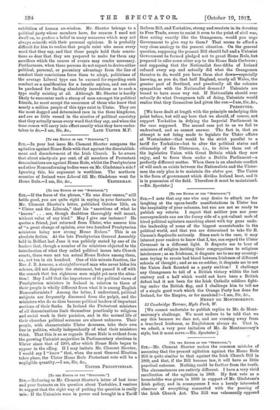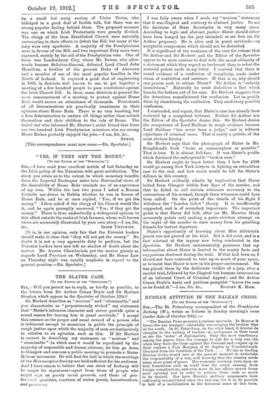[To THE EDITOR OP THE "SPECTATOR. ")
Szn,—Mr. Clement Shorter makes the common mistake of assuming that the present agitation against the Home Rule Bill is quite similar to that against the Irish Church Bill in 1869, and that, if the Bill become law, it will have as little practical outcome. Nothing could be farther from the truth. The circumstances are entirely different. I have a very vivid recollection of the agitation in 1869. My first vote as a householder was given in 1868 in support of Mr. Gladstone's Irish policy, and in consequence I was a keenly interested observer of everything connected with the passing of the Irish Church Act. The Bill was vehemently opposed
by a small but noisy section of Ulster Tories, who indulged in a good deal of foolish talk, but there was no strong popular feeling behind them. The proposed measure was one on which -Irish Protestants were greatly divided. The clergy of the then Established Church were naturally unwearying in their efforts to defeat the Bill, but many of the laity were very apathetic. A majority of the Presbyterians were in favour of the Bill, and two important Tory seats were captured, mainly by the aid of the Presbyterian vote. One of these was Londonderry City, where Mr. Dowse, who after- wards became Solicitor-General, defeated Lord Claud John Hamilton, a brother of the present Duke of Abercorn and a member of one of the most popular families in the North of Ireland. It required a good deal of engineering in 1869, in districts well known to me, to get together a meeting of a few hundred people to pass resolutions against the Irish Church Bill. In these same districts at present the mere announcement of a meeting to protest against Home Rule would secure an attendance of thousands. Protestants of all denominations are practically unanimous in their opinions about Home Rule. There is no vain boasting, but a firm determination to endure all things rather than submit themselves and their children to the rule of Rome. The individual who informed Mr. Shorter's artist friend that there are two hundred Irish Presbyterian ministers who are strong Home Rulers probably enjoyed the joke.—I am, Sir, &c.,
SENEX.
[This correspondence must now cease.—En. Spectator.]















































 Previous page
Previous page